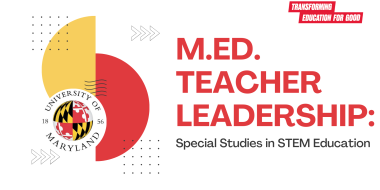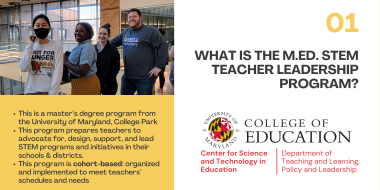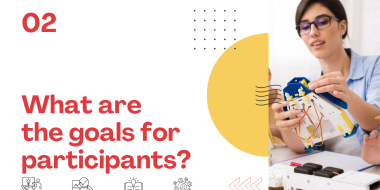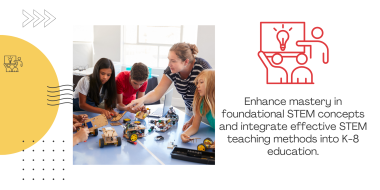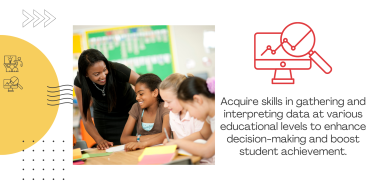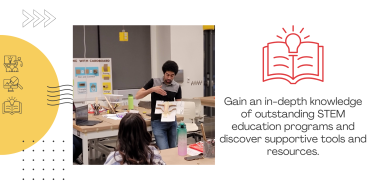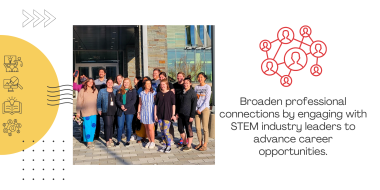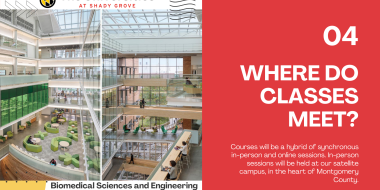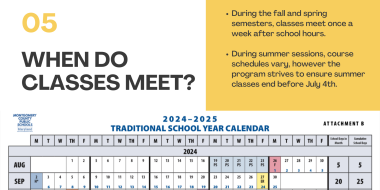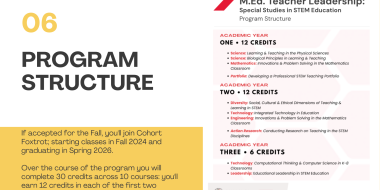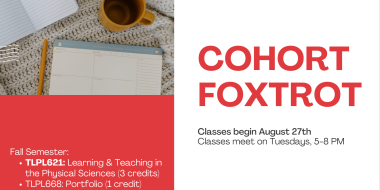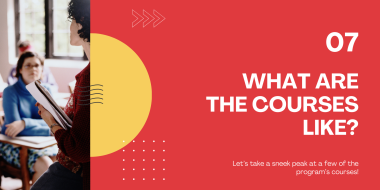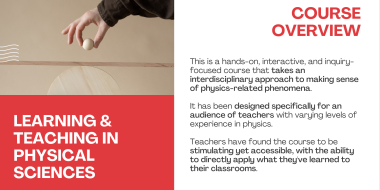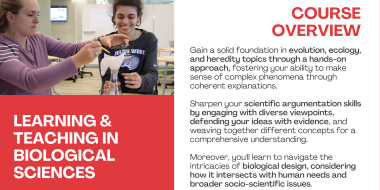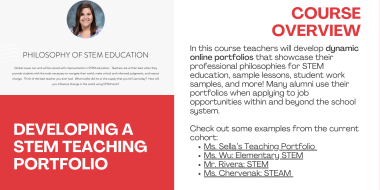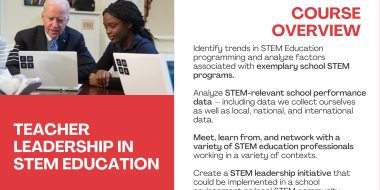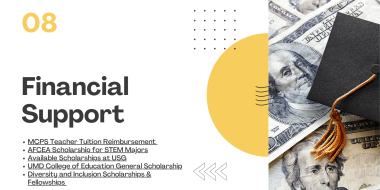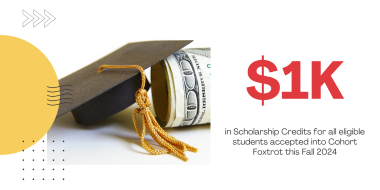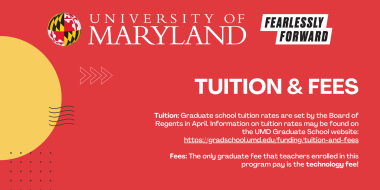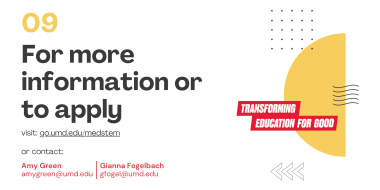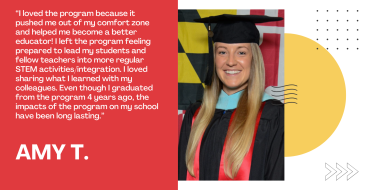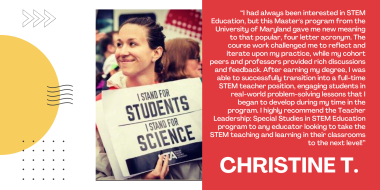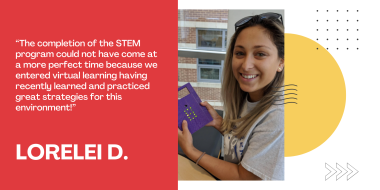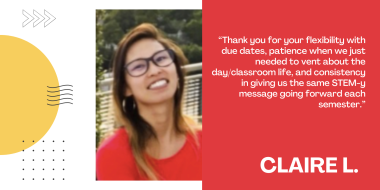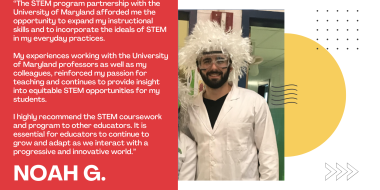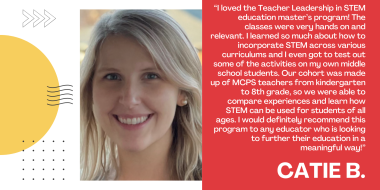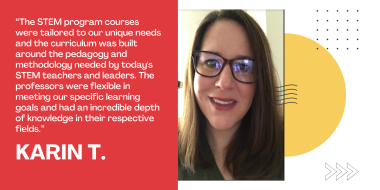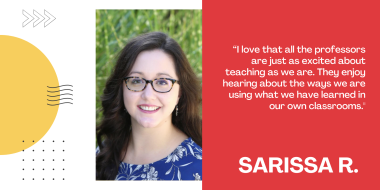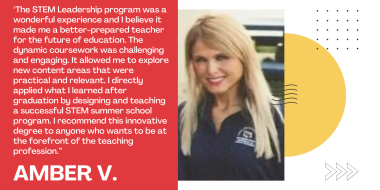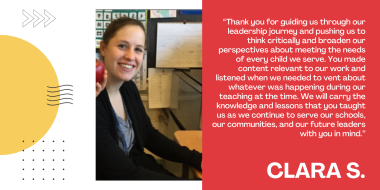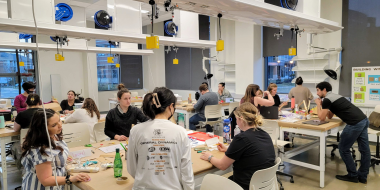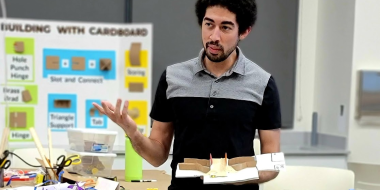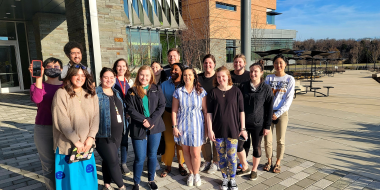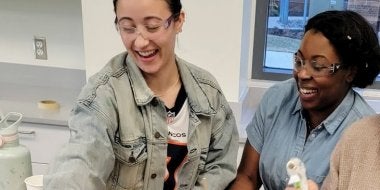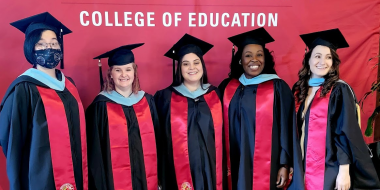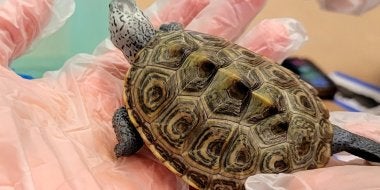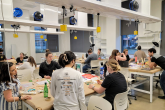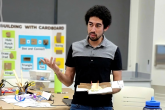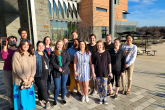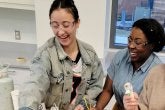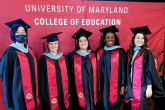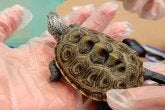Master's Programs
M.Ed. in Teacher Leadership: STEM
The M.Ed. in Teacher Leadership: Special Studies in Science, Technology, Engineering, and Mathematics (STEM) Education is an innovative program that allows in-service elementary and middle school teachers to explore relationships among science, engineering, and mathematics through a transdisciplinary approach to integrated STEM. Teachers in the program use cutting-edge technology tools to build a Professional Learning Network as they develop philosophies regarding issues of authenticity, equity, and achievement in STEM.
Each course in the program has been designed to reflect the MSDE STEM Standards of Practice as well as the core ideas and practices of the Next Generation Science Standards and the Common Core State Curriculum. Our program opens the space for teachers to explore relationships between science, engineering, and mathematics through the ‘meta-discipline’ of STEM in order to develop a holistic understanding of the world.
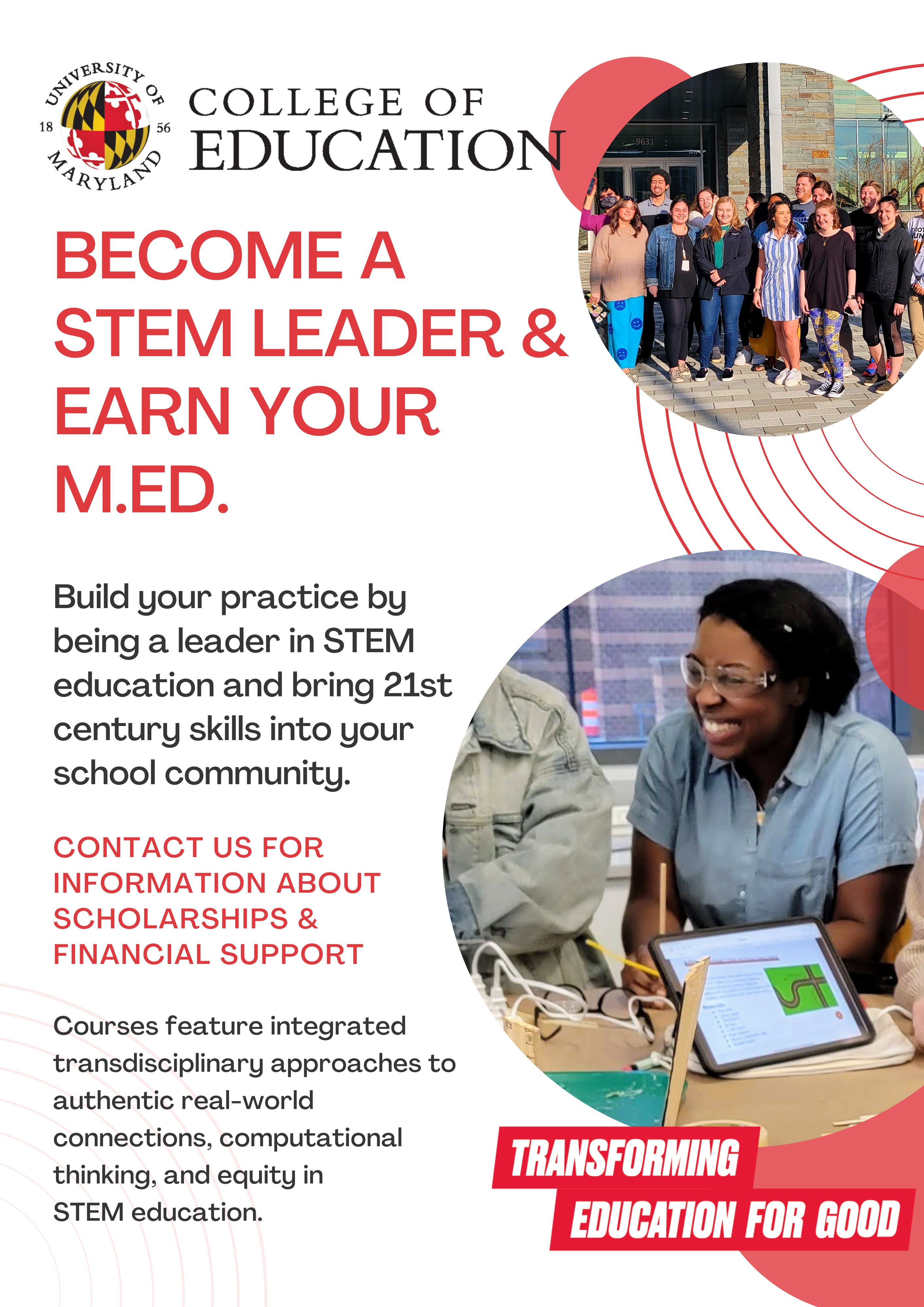
Key Themes
- Interdisciplinary STEM Education: This program promotes a perspective of interdisciplinary STEM pedagogy, integrating the core ideas and practices of different disciplines in a harmonious and holistic manner that builds on rather than erases the epistemic differences between the disciplines. Learning is contextualized and situated in real-world problems and issues.
- Teacher Leadership: Teachers develop the knowledge and skills not only to provide high-quality STEM instruction for their students but also to lead professional development and otherwise influence STEM education beyond their own classrooms. Our most enthusiastic teacher leaders mobilize and energize stakeholders within and across their school communities to improve learning opportunities for all students.
- Equity, Access, and Anti-bias Education: Committed to ensuring that all students receive equitable, productive opportunities to learn within and across the STEM disciplines—most recently, with an increased focus on EL students, we foreground anti-bias education and integrate social justice standards and critical practices from the organization, Learning for Justice, into our programs.
- Research & Inquiry: Good teaching requires life-long learning skills and dispositions. Teachers work with UMD faculty to explore relevant scholarship to inform their work and engage in their own action research to improve their practice and communicate with broader audiences. In the next cohort, teachers and faculty will explore ways teachers leverage ideas and practices related to sustainability toward academic achievement for all students within STEM disciplines.
Program Structure & Course Overviews
Learning and Teaching in the Physical Sciences
This is a hands-on, interactive, and inquiry-focused course that takes an interdisciplinary approach to making sense of physics-related phenomena. It has been designed specifically for an audience of teachers with varying levels of experience in physics. Teachers have described it as challenging without being intimidating and being able to immediately apply the learning from this course to lessons for their students!
Learning and Teaching in the Biological Sciences
This integrated and project-based course focuses on developing conceptual knowledge of core ideas in evolution, ecology, and heredity. Students develop the ability and propensity to approach the learning of new topics in biological science through tangible sense-making and coherence-building of explanations for phenomena. They will engage in scientific argumentation, which includes engaging with other people’s ideas, defending claims with evidence, and seeking coherence between different ideas and will consider issues of design in biology that are related to human needs and socio-scientific issues.
Problem-Solving and Innovative Thinking in the Mathematics Classroom
Teachers will delve into the intricate relationship between problem-solving and innovative thinking within the context of mathematics education. Through a blend of theoretical foundations and practical applications, participants will explore a variety of mathematical problems and innovative teaching methodologies aimed at developing students' abilities to think deeply and creatively in mathematical contexts.
Developing a Professional Teaching Portfolio for STEM
In this course, teachers will develop dynamic electronic portfolios that showcase their evolving professional philosophies for sustainability in STEM education, sample lessons, student work samples, and more. The following are electronic portfolios created by teacher participants:
Embracing Diversity in Classroom Communities
An exploration of the richness and complexity of student diversity that teacher candidates will encounter in K-12 classrooms with a focus on diversity in STEM. Students will engage in critical reflection around diversity and equity issues.
Teaching & Learning with Technology
This course provides a dynamic and interactive introduction to teaching and learning with technology. We will explore digital technology and its impact on learning and institutions as we consider “big ideas” of the field of integrated educational technology including computational thinking. We will discuss interdisciplinary K-12 practices that integrate technology in the service of understanding core ideas and concepts. We will review concrete examples of technology-infused lessons and technology-based assessments. The course will draw on class discussions, inquiry, instructional technology, and collaborative activities to support teachers to enhance their own teaching practice through technology.
Special Topics in Curriculum and Instruction: Engineering
After successfully completing this course you will be able to engage in engineering design to solve real-world problems. They will be able to apply programming, electronics, computer-aided design, and mechanics knowledge to engineering problems. They will also reflect on how engineering can be brought into their classrooms, and on what the purposes, strategies, challenges and benefits are for doing so. This course emphasizes computer science, using the Maryland State Department of Education’s Computer Science Standards. It also engages with community-based local STEM education organizations to engage in design-based and maker-focused learning experiences.
Conducting Research on Teaching
Teachers will learn tools and processes of action research to engage in reflective practice that examines beliefs about teaching and learning, professional learning to take responsibility for creating inclusive environments for learning and collaborating with other stakeholders, and generating evidence to continually evaluate the effects of teacher’s actions on learners, families, other professionals, and the community.
Computational Thinking & Computer Science in K-8 Classrooms
Teachers will integrate computational thinking and computer science principles into their classrooms. With a focus on inclusive and accessible pedagogies, the course aims to equip educators with the knowledge, skills, and strategies necessary to foster a foundational understanding of computer science among learners.
Reframing Teacher Professionalism: Achieving Teacher Leadership
Teachers will identify “trends” in STEM education programming and analyze factors associated with sustained, exemplary implementation. Teachers will analyze relevant school performance data – including data we collect ourselves as well as local, national, and international data. Teachers will meet, learn from, and network with a variety of professionals working in a variety of STEM contexts. For the culminating project of this teacher leadership degree program, teachers will submit a formal, evidence-based plan for advancing STEM education in their school communities.
To begin the admission application process for the Science Technology /Engineering Mathematics (STEM) Montgomery County (MCSTE) program, please follow the instructions below. Applications are rolling until the cohort is filled.
STEM Graduate Application Process
Click on the University of Maryland Graduate Online Application link: gradapply.umd.edu. Click on “Create Account” tab, complete the form, create a user name and password and submit.
Click on ”Access Your Online Application” page and complete the following sections:
- Demographics and Contact Information
- Educational Intent Section: (Enter the following information)
- Applicant Type: Degree
- Level of Study: Masters
- Intended Program of Study: Curriculum and Instruction
- Term of Entrance: Fall 2024
- College/School: College of Education (will be pre-populated)
- Area of Interest 1: Science/Technology/Engineering/Mathematics (Montgomery County/Off-Campus)(MCSTE)
- Area of Interest 2: Not Applicable/Off-Campus
- Previous Education Section: Enter names of the institutions of higher education at which you have received 9 credits or more and upload unofficial transcripts with degree conferred, if applicable (required) (see notes below)
- Personal Information and Maryland Residency Information
- Program Upload Requirement Section: upload your Personal statement and resume
- Recommendations: Enter the 3 recommender names and email addresses (required)
- Pay $75 non-refundable application fee
Please make sure you upload all of the required documentation.
Note regarding Transcripts: Scanned copy of transcripts must be uploaded into your application file with degree conferred. Official transcripts are required by the Graduate School by the end of the first term of enrollment if accepted into the program and the University. Applicants must have official, sealed undergraduate and graduate transcripts from all post-secondary schools attended (with 9 credits or more) sent to the Graduate School at:
University of Maryland College Park
Enrollment Services Operation
Attn: Graduate Admissions
Room 0130 Mitchell Building
College Park, MD 20742
Electronic Transcripts: gradschool@umd.edu Attn: Heather Kissinger
Other Master's Programs
The Master’s Certification Program (MCERT) is a graduate-level teacher preparation program that leads to elementary, middle school, secondary or preK-12 teacher certification and a Master of Education (M.Ed.). Content area specializations include Art, Dance, Elementary Education, English, Mathematics, Middle School Math and Science, Physical Education, Secondary Sciences (Agriculture, Biology, Chemistry, Computer Science, Earth/Space Science, Physics), Social Studies, TESOL (Teaching English to Speakers of Other Languages), and World Languages (Chinese, French, German, Italian, Latin, Russian, Spanish).
The 13-month, 42-credit program is an intensive, full-time experience that integrates both theory and practice in a school-based program. Interns will be engaged in learning and teaching activities at a school site during the weekdays. In addition, interns will attend pedagogy and education courses on two nights a week as well as some Saturdays. The demands of this compact, intensive experience preclude MCERT interns from employment or graduate assistantships during the internship year. The MCERT program is offered only on an intensive full-time basis. We offer some of our courses in a hybrid format.
Candidates for the M.A. Science Education Program at the University of Maryland are K-12 or college-level teachers, other education professions, and/or people with a science background interested in careers in research and education-related careers outside K-12 schools. We usually recommend a M.Ed. instead of an M.A. program for candidates seeking to further their careers within K-12 schools. The Master of Arts is a 30-semester hour program that requires coursework in education, coursework in a science discipline, and a small independent research project.
